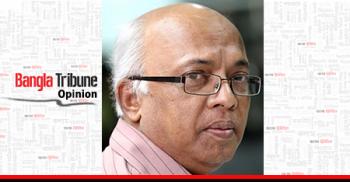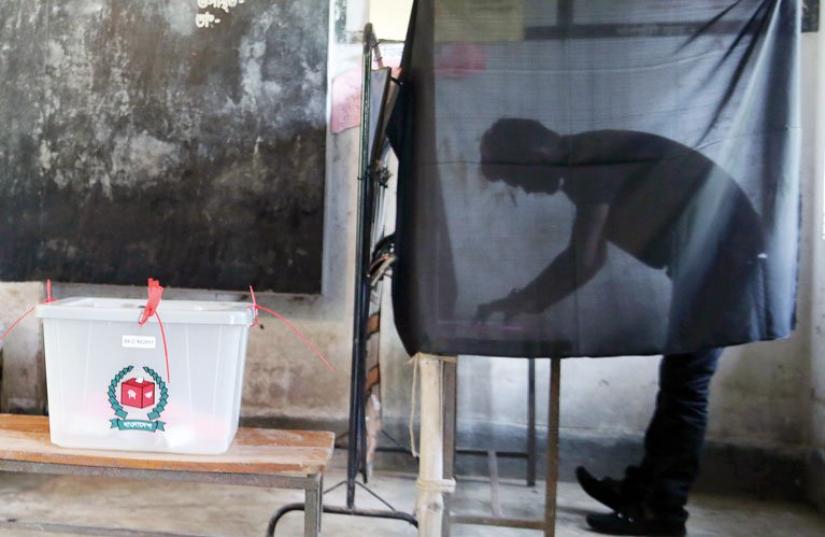 Elections anywhere are a reason for some profound memories to come alive. Now that Bangladesh’s people are proceeding towards what hopefully will be a meaningful exercise of the right of franchise, there is that certain tug at the heart about remembrance of elections past in our part of the world.
Elections anywhere are a reason for some profound memories to come alive. Now that Bangladesh’s people are proceeding towards what hopefully will be a meaningful exercise of the right of franchise, there is that certain tug at the heart about remembrance of elections past in our part of the world.
For those who are part of the generation to which yours truly belongs, faint and almost faded images of the elections for Ayub Khan’s Basic Democracy system in 1964 stir themselves, enough to give rise to a certain wave of nostalgia. It was in Quetta that my father was approached by all the candidates to seek his vote. On the day of the election, he voted for the nominee who ended up losing. But that did not matter, for soon the triumphant candidate, a proper Pathan, was carried through the neighbourhood by his slogan-chanting fans on their shoulders. As my father watched, the victory procession came to a halt outside our gate. Soon full-throated slogans of ‘Haq Sahib zindabad’ rent the air. Those men were complimenting my father for having voted for their candidate! All my father could say was shukriya (thank you), with an impish smile playing on his lips.
As a schoolboy, I read with ceaseless interest of the presidential election campaign towards the end of 1964. Field Marshal Ayub Khan, in the occupation of the presidency since the coup d’etat of October 1958, was pitted against Fatima Jinnah, the ageing sister of Muhammad Ali Jinnah. The electorate, of course, was the 80,000-strong Basic Democracy system. A yet-to-be Bangabandhu Sheikh Mujibur Rahman crisscrossed East Pakistan trying to drum up support for Ms. Jinnah, whose candidacy was being sponsored by the Combined Opposition Parties (COP). In the event, Ayub Khan beat back the challenge from the lady. There were the doubters who thought that the dictator had stolen the election, which was held in the first week of January 1965. No one asked for a recount.
One might go back a little in time, to the late 1950s in fact, for the good reason that general elections were for the very first time expected to be held in Pakistan in February 1959. The coup launched by Iskandar Mirza and Ayub Khan three months earlier put paid to the plan. If one goes even further back, to March 1954, one cannot but recall the euphoria generated by the provincial assembly elections in East Bengal. The Jukto Front led by Shere Bangla, Moulana Bhashani and Huseyn Shaheed Suhrawardy comprehensively trounced the ruling Muslim League led by Chief Minister Nurul Amin. But the triumph was not destined to last. Within a couple of months, on flimsy and false pretexts, the central government in Karachi dismissed the Jukto Front ministry.
To date, the most significant election in our part of the world took place in December 1970. Bangabandhu, in the course of the election campaign, never failed to remind people that the vote would be a referendum on his party’s Six-Point plan for regional autonomy. His thoughts were endorsed by his people, so much so that the Awami League ended up winning an overall majority through the vote, enough to form a new central government for the whole of Pakistan. The rest, as they say all so often, is history. Because the Awami League won the vote, it seemed, the West Pakistan-based ruling elite was prepared to lose the eastern wing of the country. It repudiated the election results and ended up confronting a situation where half the country simply went away, to no one’s regret. And, yes, the first general elections in independent Bangladesh in March 1973 were a cakewalk for the Awami League, with little or nothing of an opposition left in parliament.  The bittersweet stories of other elections come to mind. The elections supervised by the military regime of General Ziaur Rahman, first the presidential in June 1978 and then the parliamentary in February 1979, had little to do with restoring democracy but everything to do with a repudiation of history. That was the wrenching moment in time when the Bengali nation effectively came to be divided through the weapons of new-fangled communalism and a spurious new nationalism. The Zia elections remain notorious for the formal shape they gave the infamous Indemnity Ordinance through the equally notorious Fifth Amendment to the constitution.
The bittersweet stories of other elections come to mind. The elections supervised by the military regime of General Ziaur Rahman, first the presidential in June 1978 and then the parliamentary in February 1979, had little to do with restoring democracy but everything to do with a repudiation of history. That was the wrenching moment in time when the Bengali nation effectively came to be divided through the weapons of new-fangled communalism and a spurious new nationalism. The Zia elections remain notorious for the formal shape they gave the infamous Indemnity Ordinance through the equally notorious Fifth Amendment to the constitution.
At the presidential election of November 1981 following Zia’s assassination, the Awami League’s Dr. Kamal Hossain had little chance of beating Justice Abdus Sattar, who went on to assume the office in his own right, only to be overthrown a few months later in a coup by the army chief, General Ershad. Since all extra-constitutional and therefore illegal regimes seek political legitimacy, however questionable, at some point, the Ershad dispensation called parliamentary elections in 1986. The Awami League participated in the vote, but the Bangladesh Nationalist Party, yet incensed with Ershad over his coup, stayed away. For years together, the BNP accused the AL of providing legitimacy to the regime by joining the election. For its part, the Awami League let it be known that the BNP had reneged on a joint AL-BNP strategy of challenging Ershad and so had stayed away from the vote.
Public opinion more than anything else compelled General Ershad to disband parliament in 1988 and call new elections. The show turned out to be a dismal one, with both the BNP and the AL boycotting it. Intriguingly, ASM Abdur Rab, he of a fractured Jatiyo Samajtantrik Dal, found himself in the position of leader of the opposition in the new, albeit toothless parliament. No one took the 1988 Jatiyo Sangsad seriously. It died of malnutrition when its principal patron, in this case, Ershad, was forced from power in December 1990.
The general elections of February 1991, on the watch of the caretaker government led by Justice Shahabuddin Ahmed, surprised the country as a whole. It was the general expectation that the Awami League would win and form the government. That was not to be as the BNP, to its own surprise, took the lead in garnering enough seats to form the government. A bitter Awami League sat in opposition but made sure it made a lot of noise. And then the BNP, through a botched by-election in Magura in 1994, gave Sheikh Hasina and her party the perfect reason to demand fresh general elections under a new caretaker administration. The road to a new electoral exercise coursed through many twists and turns, an instance being the ignored election called by Khaleda Zia’s government in February 1996. The BNP then bit the dust when, in new elections overseen by the caretaker government of Justice Habibur Rahman, the Awami League rode back to power after a twenty-one-year hiatus in June 1996.
The general elections of October 2001 were a shock for the Awami League, but a reason for celebration for the BNP. And let it not be forgotten that it was that dark moment in history when the Jamaat-e-Islami, notorious for its collaborationist role with the Pakistan army in the War of Liberation, made its way into the corridors of power piggyback on the BNP. Two of its leading figures, war criminals of 1971, became ministers in the very country they and their murderous brigands had violently opposed through the genocide perpetrated by the Pakistani forces.
And, of course, we recall the events and incidents which led to the general elections of December 2008. A beaming Awami League returned to office while a despondent BNP felt lost in what it saw as a wilderness for its politics. The elections of January 2014 may have placed as many as 153 individuals unopposed in parliament; they may have been condemned by many as a one-sided electoral exercise. The truth, though, is something else, which is that the elections were held within the parameters of the constitution and indeed were a conscious measure put in place to ensure the continued legitimacy of democratic politics.
Thus the past. And now comes the future, thirty-four days away.
Syed Badrul Ahsan is Editor-in-Charge, The Asian Age


